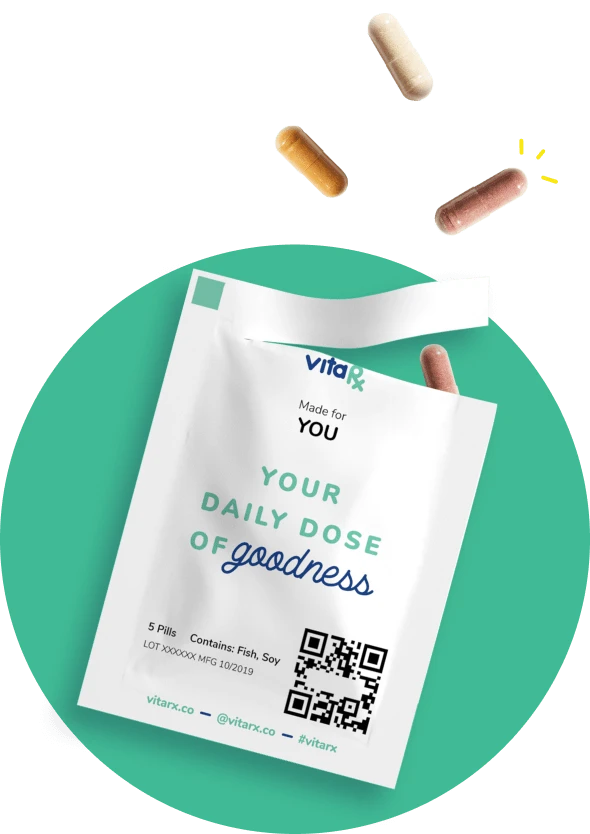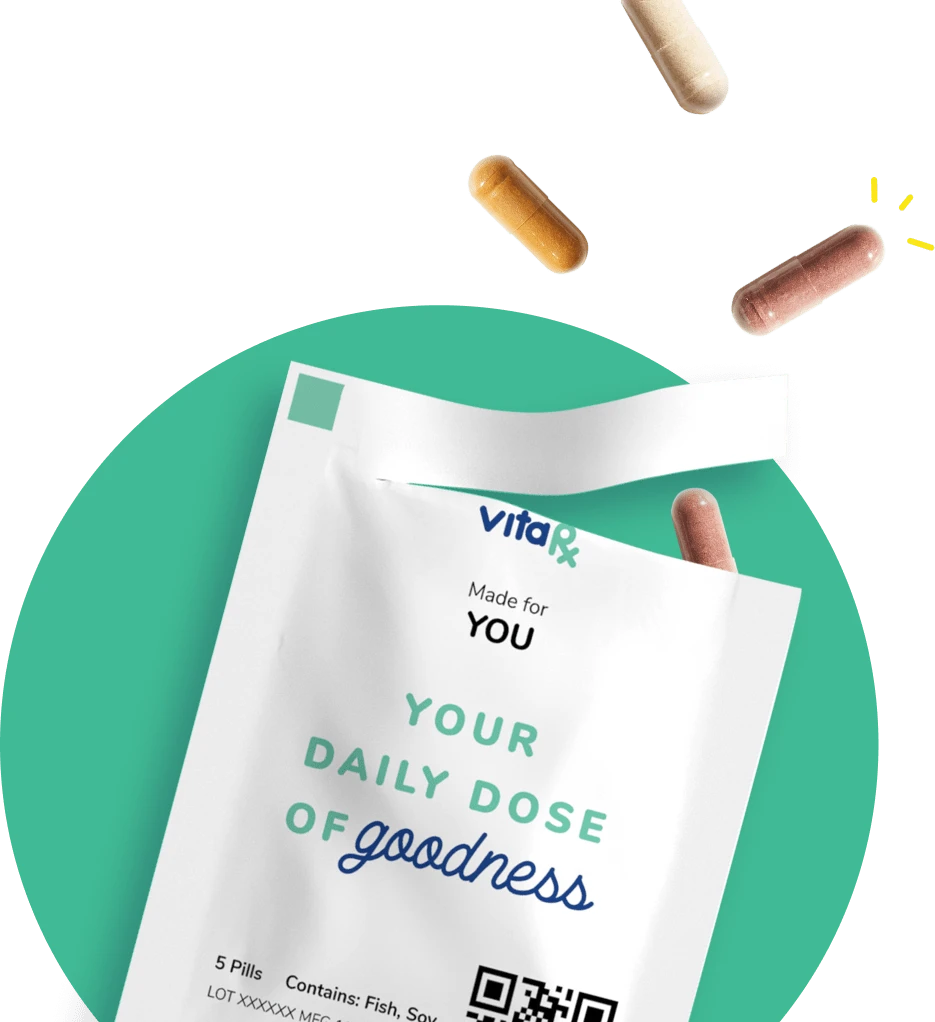Last update: December 25, 2024
Vitamin D: The Complete Guide
Discover the essential guide to Vitamin D, covering dosage, benefits, side effects, and more. Learn how Vitamin D supports bone, muscle, and immune health, obtainable from sunlight, fortified foods, or supplements.

By Derick Rodriguez, Associate Editor
Edited by Dr. Dimitar Marinov, MD, RDN, PhD

Key takeaways
- Vitamin D is crucial for bones, muscles, nerves, and the immune system
- You can get it from sunlight, foods, or supplements
- Insufficient intake might cause issues like rickets in kids and osteomalacia in adults
- Taking too much can lead to problems, so it’s important to follow recommended dosages
What is vitamin D?
Vitamin D is a crucial nutrient primarily produced in the presence of sunlight. Its primary association lies in promoting calcium absorption, supporting bone health, and supporting bone growth and remodeling [1].
Your body needs vitamin D to function properly. Primarily known for its role in promoting calcium absorption, vitamin D is crucial for maintaining optimal bone health and facilitating bone growth. Additionally, it plays a role in supporting the immune system and muscle strength [2].
Can your body produce vitamin D?
Your body can produce vitamin D when exposed to sunlight, earning it the nickname "sunshine vitamin." Sunlight, specifically ultraviolet B (UVB) rays, triggers a process in the skin that synthesizes vitamin D. A well-rounded approach, including sunlight exposure, a balanced diet, or supplements, helps maintain optimal vitamin D levels [1, 2].
Vitamin D is not actually a vitamin
Despite its name, vitamin D functions not as a vitamin but as a steroid hormone that the body can produce. It can be synthesized in the skin through UV (ultraviolet) exposure.
Different types of vitamin D
There are two forms of vitamin D: vitamin D2 and D3. While both forms can help meet vitamin D requirements, there are key differences between them.
- Vitamin D2 (Ergocalciferol)
Vitamin D2 comes from plant sources, mushrooms, and fortified foods exposed to UVB light. It is less expensive to produce and commonly added to fortified foods. While effectively absorbed, D2 may be less efficient than D3 at raising and sustaining vitamin D levels. D2 supplements may be more susceptible to degradation due to humidity and temperature sensitivity. - Vitamin D3 (Cholecalciferol)
Vitamin D3 is found in animal-based foods and synthesized in human skin from UVB sunlight. This self-regulating process prevents overdose. D3 is more effective than D2 in increasing and maintaining blood vitamin D levels, making D3 supplements widely available and recommended. Evidence suggests that D3 supplements are stable under various conditions.
How does vitamin D work in your body?
What are some benefits of vitamin D?
Vitamin D is essential for maintaining good health. Maintaining sufficient vitamin D in your diet has several benefits.
Promotes bone health
Vitamin D supports calcium absorption, promoting bone growth and remodeling. Maintaining adequate bone density and supporting the prevention of conditions like osteoporosis are important aspects of its contribution [4].
Supports immune system
Research suggests that maintaining sufficient vitamin D levels may contribute to immune system support, potentially reducing the risk of acute respiratory infections, especially in people with deficiencies [5].
Enhances muscle recovery
Beyond its renowned bone-building abilities, vitamin D may play an important role in muscle recovery after exercise. This not only aids in bone support but may also contribute to enhanced balance, potentially reducing the risk of falls [6].
Supports oral health
While limited, some research indicates that vitamin D, by aiding calcium absorption, may have a positive impact on oral health. This includes a potentially lower risk of tooth decay and gum disease [7].
What are some signs of vitamin D deficiency?
Vitamin D deficiency can manifest through various signs, indicating potential health concerns related to inadequate levels of this essential nutrient [9]:
- Bone Density Loss: Insufficient vitamin D may contribute to decreased bone density, potentially leading to bone-related issues.
- Bone Pain: Deficiency can result in bone pain, discomfort, or tenderness, signaling possible effects on skeletal health.
- Rickets: In severe cases, particularly in children, vitamin D deficiency may lead to rickets, a condition causing weakened and softened bones.
- Weak Bones or Muscles: Insufficient vitamin D can impact both bones and muscles, potentially resulting in weakness and compromised overall musculoskeletal health.
Never self-diagnose
If you feel you may have a deficiency or are concerned or curious about taking this supplement, talk to a doctor or healthcare professional. They can accurately diagnose and recommend the appropriate treatment plan for your specific needs.
Sources of vitamin D
Vitamin D is available from various sources, primarily from foods but also from supplements when dietary intake is insufficient.
Vitamin D-rich foods
Below is a categorization of various foods based on their vitamin D content, helping you to identify sources that can boost your dietary vitamin D intake[10].
Is food intake always the best?
Obtaining vitamin D from food is generally recommended. However, in cases of significant deficiency, dietary restrictions, or certain health conditions, supplements may be necessary.
Vitamin D supplement formulations
Delivery methods
Vitamin D supplements come in various delivery methods, each offering its own set of benefits and ways of consumption. Here's a brief overview of the different delivery methods.
Choose a method that fits your routine
Do not overlook the delivery method. Vitamin D supplements come in tablets, capsules, soft gel, chewable, powders, and liquid forms—choose the one that best fits your daily routine to stay consistent.
What to look for in vitamin D supplements
Taking vitamin D supplements has its potential benefits, but it may not be for everyone.
Dosage and potency
The dosage of vitamin D in supplements varies, so it's important to choose one that aligns with your specific needs. This includes considering your age, gender, and health status, like pregnancy or existing deficiencies. The vitamin D formulation can impact its potency and bioavailability, which affects how effectively your body can absorb and use it.
Quantity and delivery method
The delivery method is crucial. Vitamin D supplements come in various forms, including tablets, capsules, powders, chewables, and liquid forms. Your choice may depend on factors like ease of swallowing, convenience for traveling, or personal preference regarding taste and texture. Also, evaluate the quantity of vitamin D to determine how long it will last based on your daily requirements.
Quality and manufacturing
Quality is paramount when selecting vitamin D supplements. Look for products manufactured under strict quality control guidelines and those that have undergone third-party testing for purity and label accuracy. Certifications from recognized bodies can be a reliable indicator of a high-quality product. Additionally, consider the manufacturer's reputation and transparency in their production processes.
How and when should you take vitamin D complex for maximum absorption?
To get the most out of your Vitamin D complex supplement, it's crucial to consider the timing and method of consumption. The following dos and don'ts offer guidance on optimizing absorption, efficiently supporting your health and wellness, and minimizing potential discomfort:
Do’s
Take with meals for enhanced absorption.
Establish a consistent intake routine.
Consider liquid form for precise dosage control.
Consult with a healthcare provider before combining with medications
Don’ts
Avoid an empty stomach; take with food.
Swallow capsules whole; do not chew.
Who should take vitamin D?
Recommended dosage
Vitamin D plays an important role in many physiological processes, and getting the right dosage is essential for maintaining optimal health at different life stages. Here are the recommended dosages for vitamin D across various age groups [10].
Side effects of excessive vitamin D consumption
While vitamin D is generally safe when taken within recommended limits, excessive intake can have adverse effects:
- Gastrointestinal Distress: Excessive vitamin D intake may cause nausea, diarrhea, and abdominal cramps.
- Kidney Stones Formation: High doses of vitamin D can lead to the formation of kidney stones, particularly in people predisposed to this condition [11].
Always consult your doctor
If you're experiencing side effects, consult your healthcare provider. They may recommend a different vitamin D formulation or adjust your dosage. Balancing your vitamin D needs with any discomfort is crucial and should not be overlooked.
Health made easy: your go-to resource for essential vitamins and supplements
Frequently asked questions about vitamin D (FAQ)
Our library of expert-authored articles covers just about every question you might have about vitamins, minerals, and supplements — along with some you might not have known you had.
Final thoughts
Vitamin D is crucial for bone health, immunity, and overall well-being, with benefits ranging from bone strengthening to supporting the immune system. You can obtain it from sunlight, food, or supplements if necessary. It's vital to follow recommended doses, be aware of potential side effects, and consider individual factors.
Sources and references
- Sunlight and Vitamin D - PMC
- Vitamin D and Human Health - PMC
- Vitamin D: Production, Metabolism and Mechanisms of Action - Endotext - NCBI Bookshelf
- Vitamin D and Bone Health; Potential Mechanisms - PMC
- Vitamin D and the Immune System - PMC
- Vitamin D and Its Role in Skeletal Muscle - PMC
- Vitamin D Deficiency and Oral Health: A Comprehensive Review - PMC
- The Effect of Vitamin D Supplementation on Incidence of Type 2 Diabetes: A Systematic Review - PMC
- Vitamin D Deficiency - StatPearls - NCBI Bookshelf
- Vitamin D - Fact Sheet for Health Professionals
Editor

Derick Rodriguez
Derick Rodriguez focuses on editing health and wellness-related content. With over half a decade of experience in the digital realm, Derick has developed a unique skill set that bridges the gap between complex health concepts and accessible, user-friendly communication. His approach is deeply rooted in leveraging personal experiences and insights to illuminate the nuances of health and wellness topics, making them more approachable and empowering readers with knowledge and confidence.
Fact checker

Dr. Dimitar Marinov
Dr. Marinov has years of experience in scientific research and preventive and clinical medicine. His publications in peer-reviewed journals are on nutritional status, physical activity, and musculoskeletal disorders among adolescents.
At VitaRx, we're not just passionate about our work — we take immense pride in it. Our dedicated team of writers diligently follows strict editorial standards, ensuring that every piece of content we publish is accurate, current, and highly valuable. We don't just strive for quality; we aim for excellence.
Related posts
While you're at it, here are some other relevant articles you might be interested in.

Get your personalized vitamin recommendations in less than 3 minutes.
Get your personalized vitamin recommendations in less than 3 minutes.











